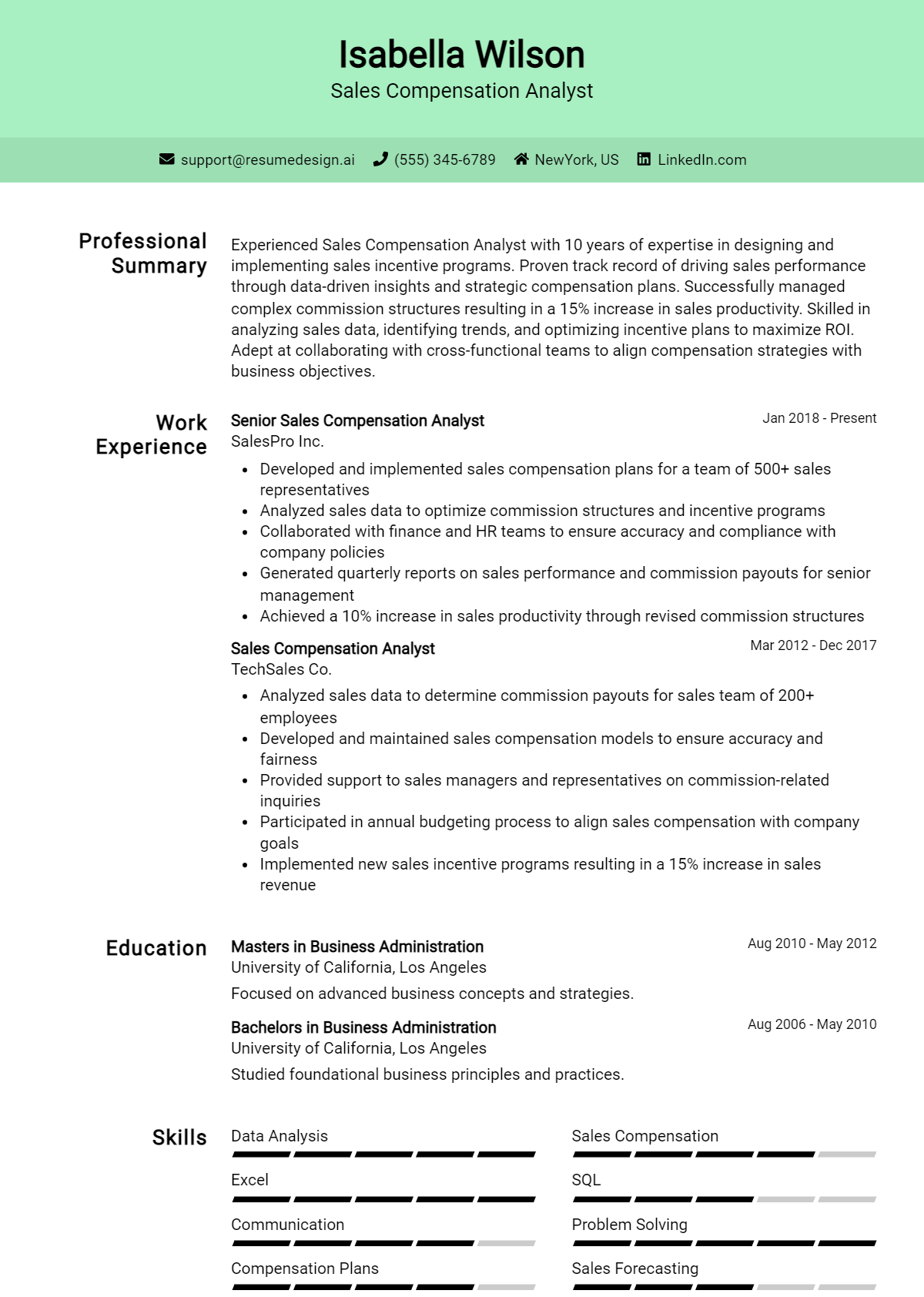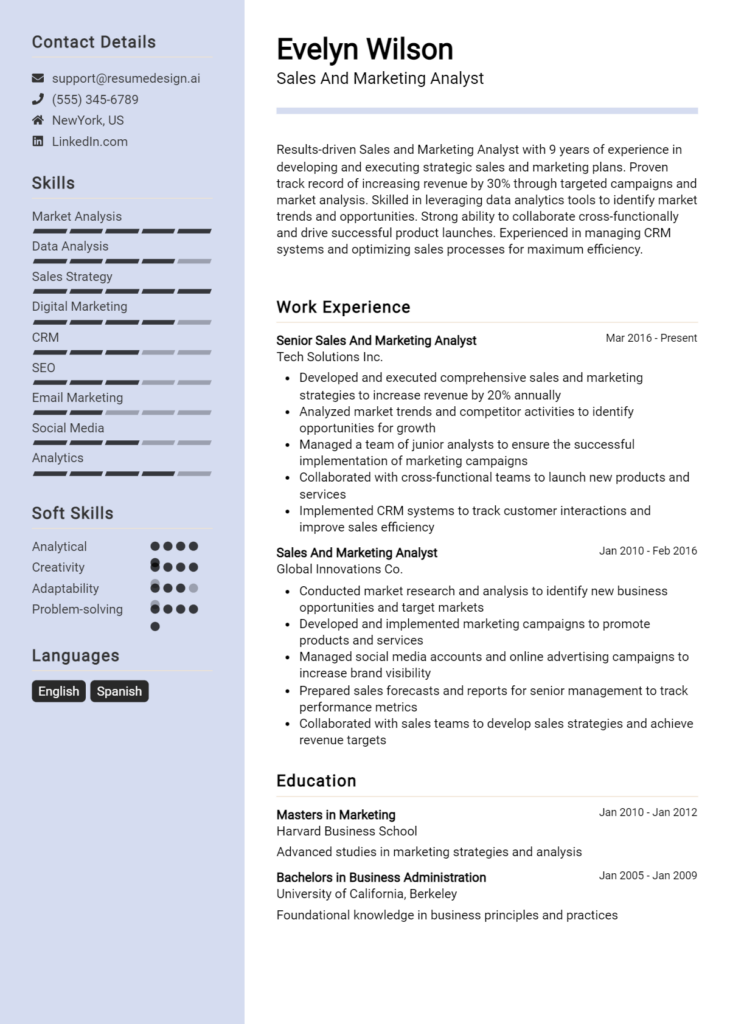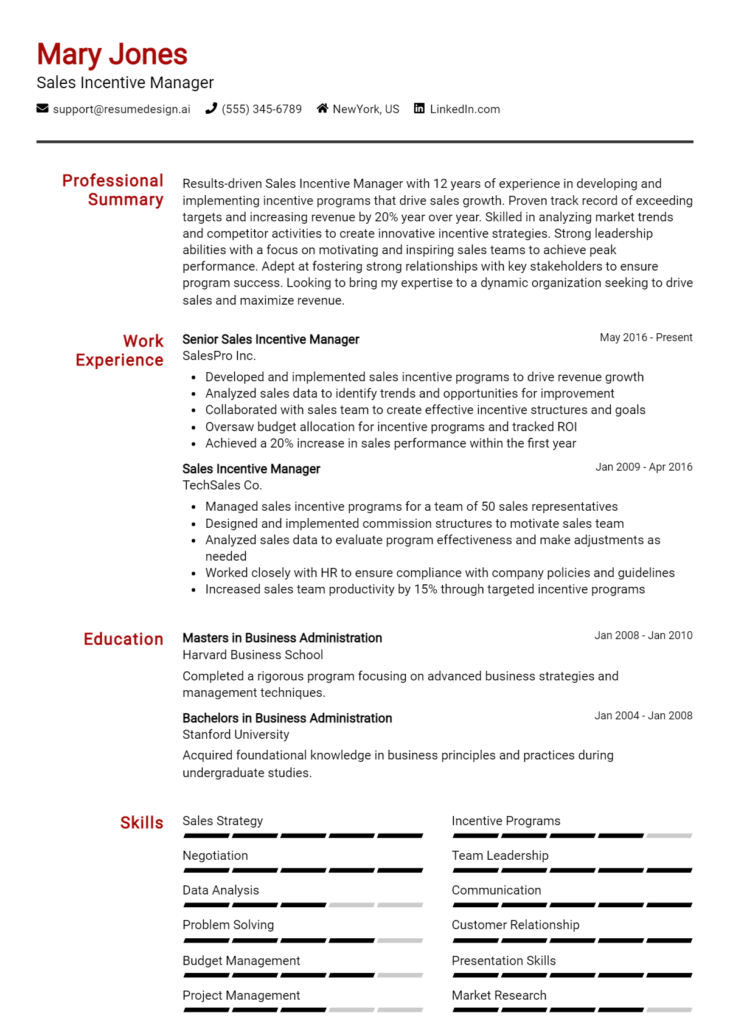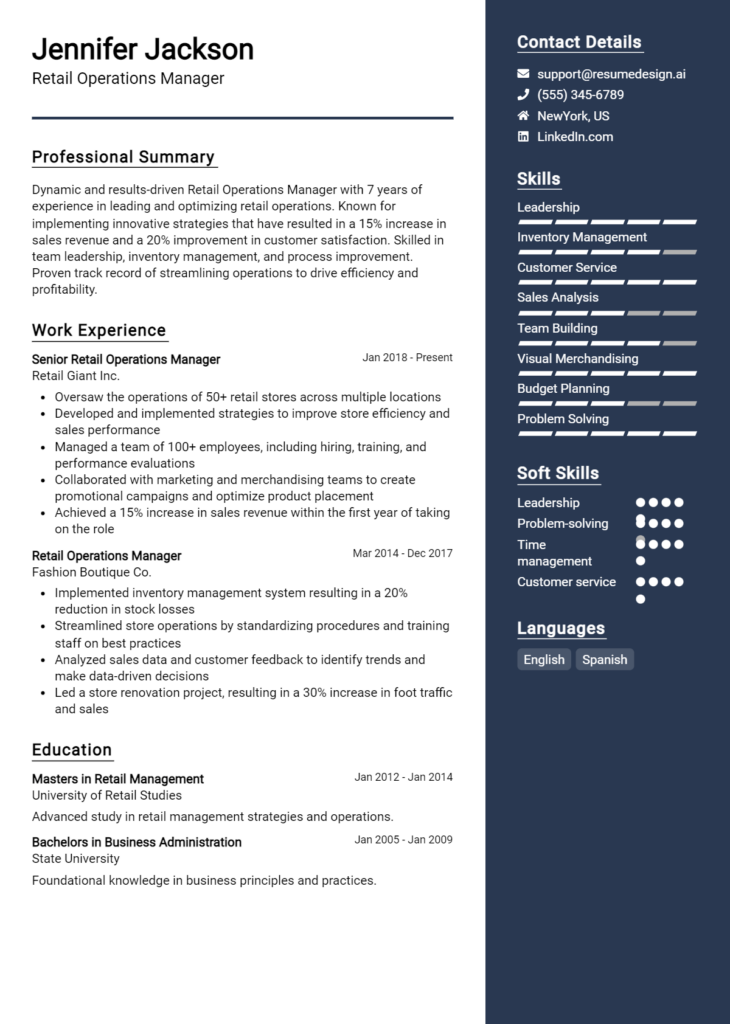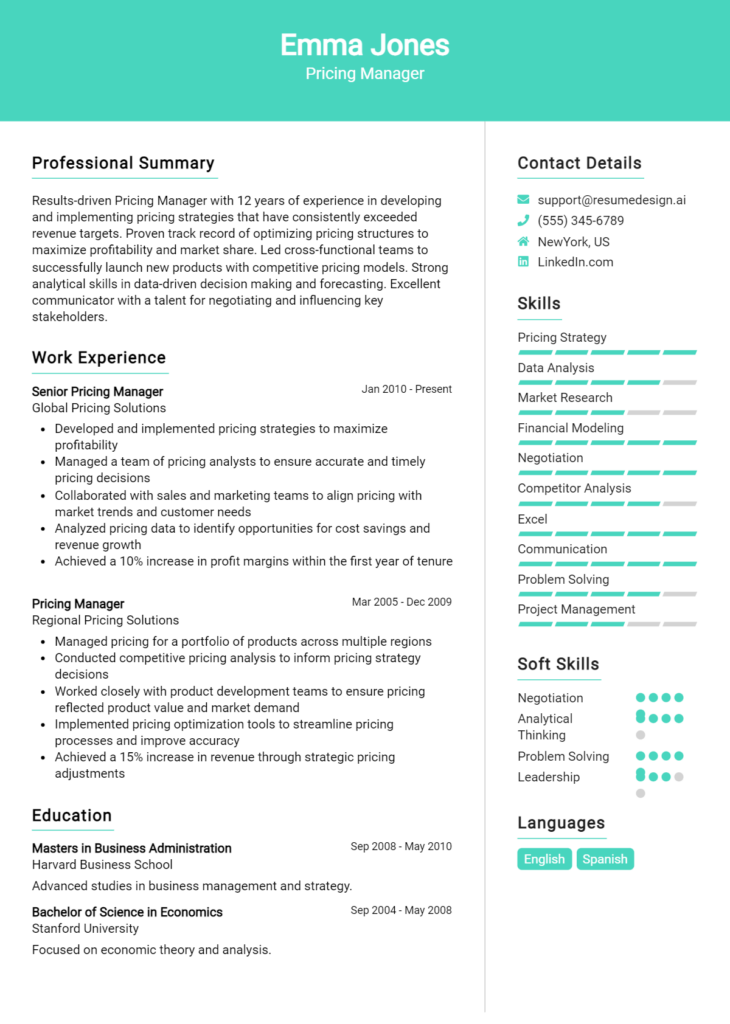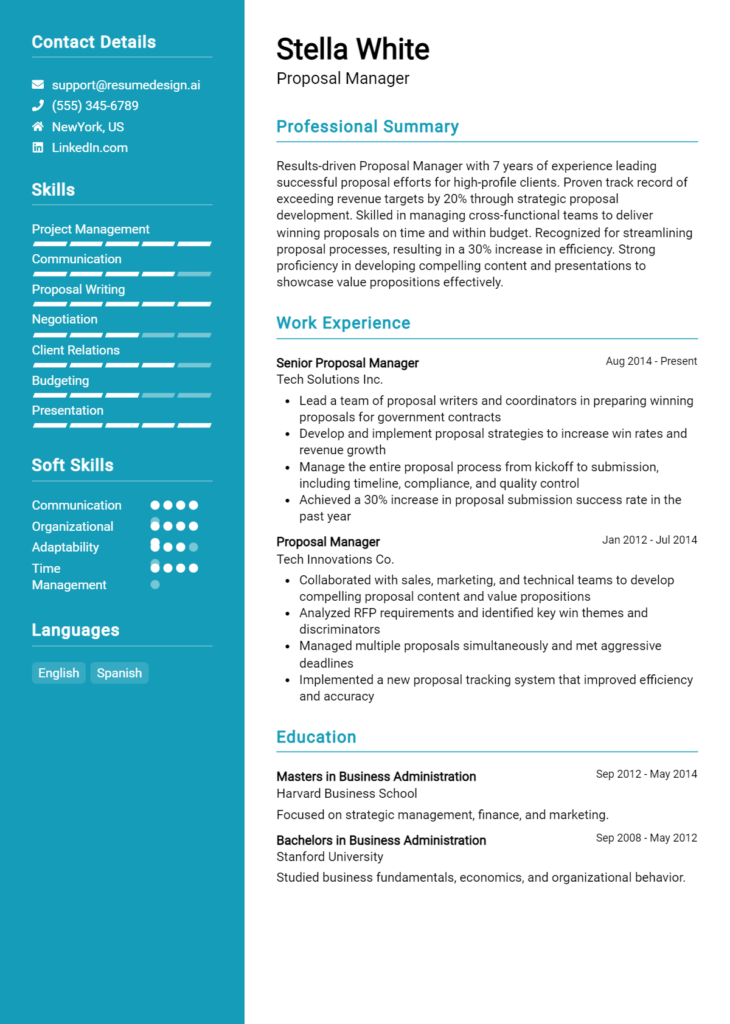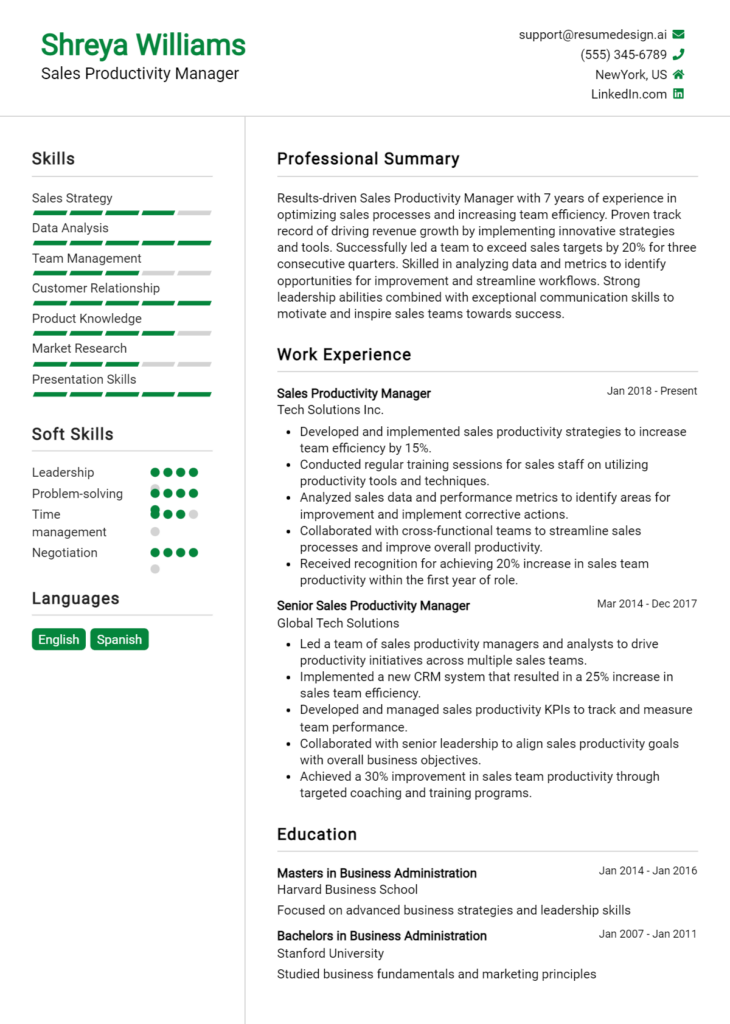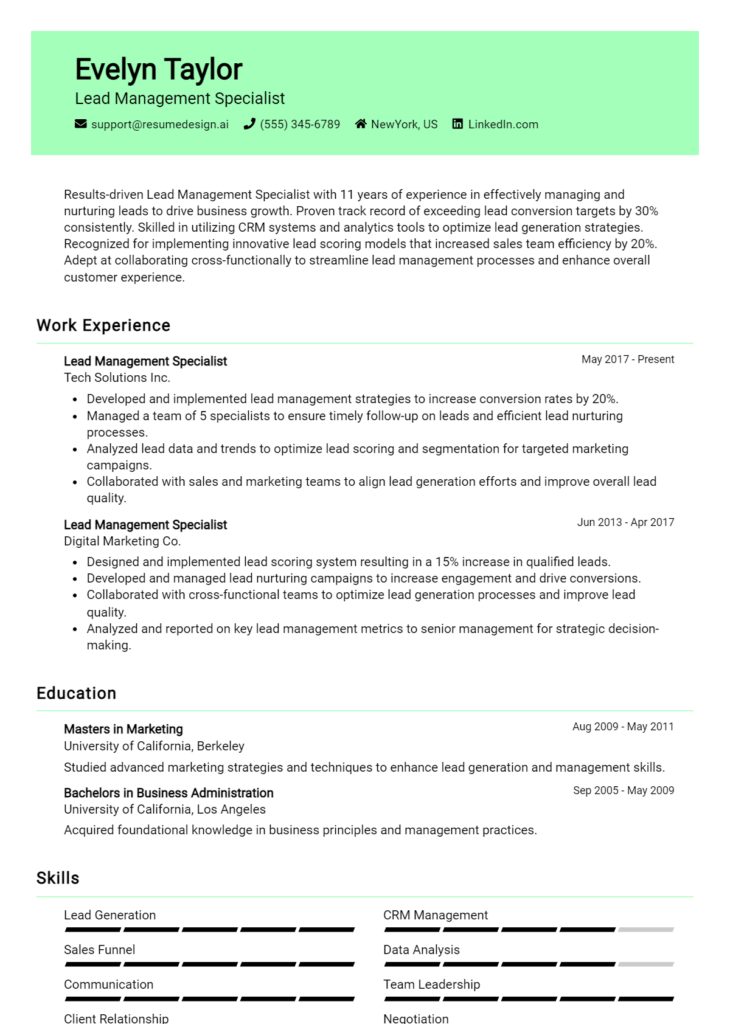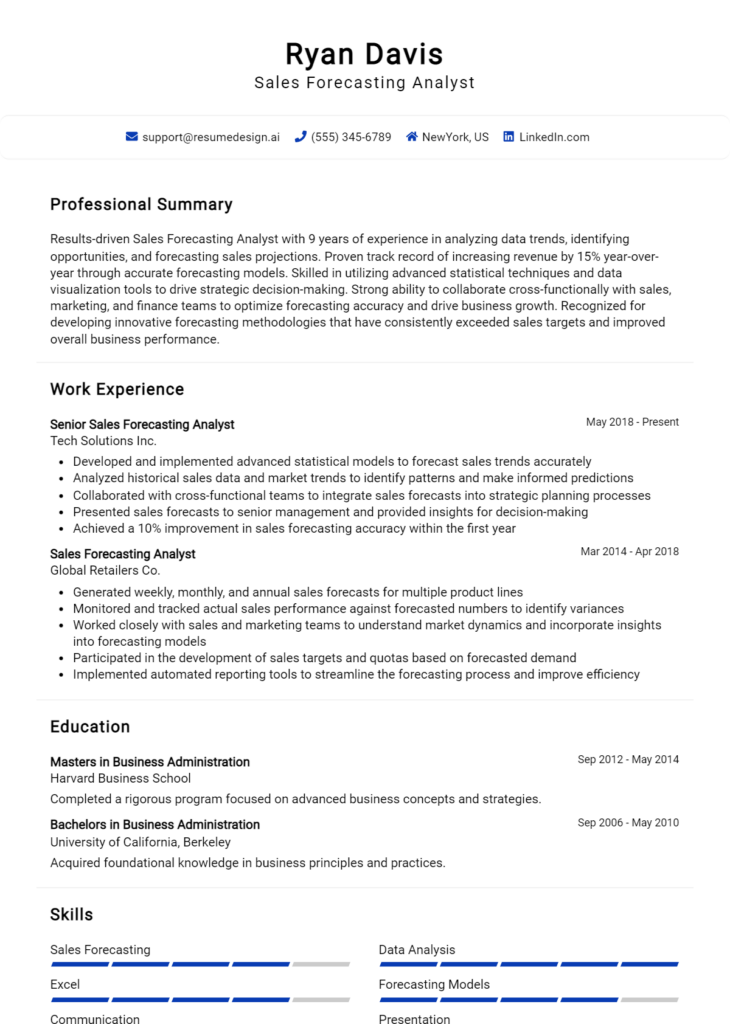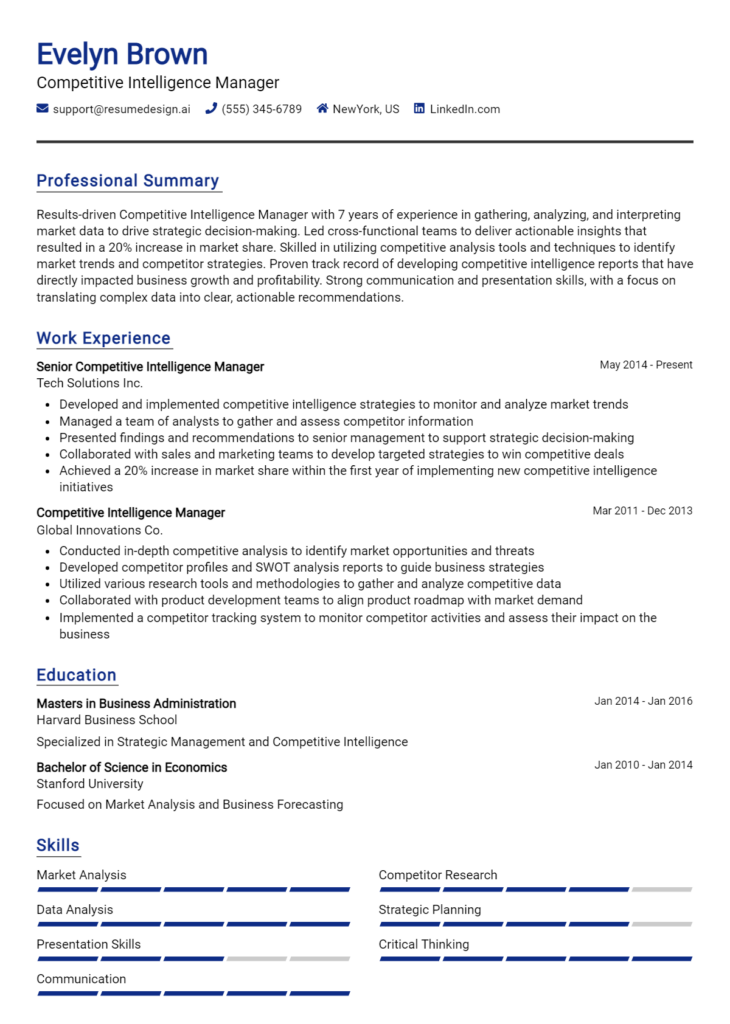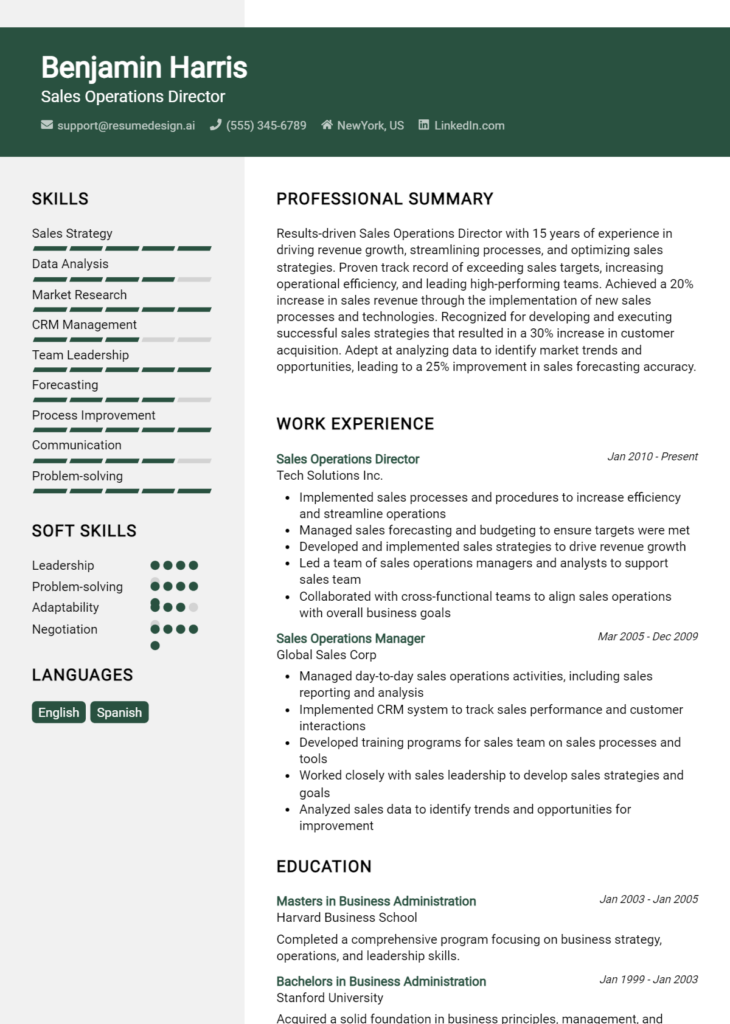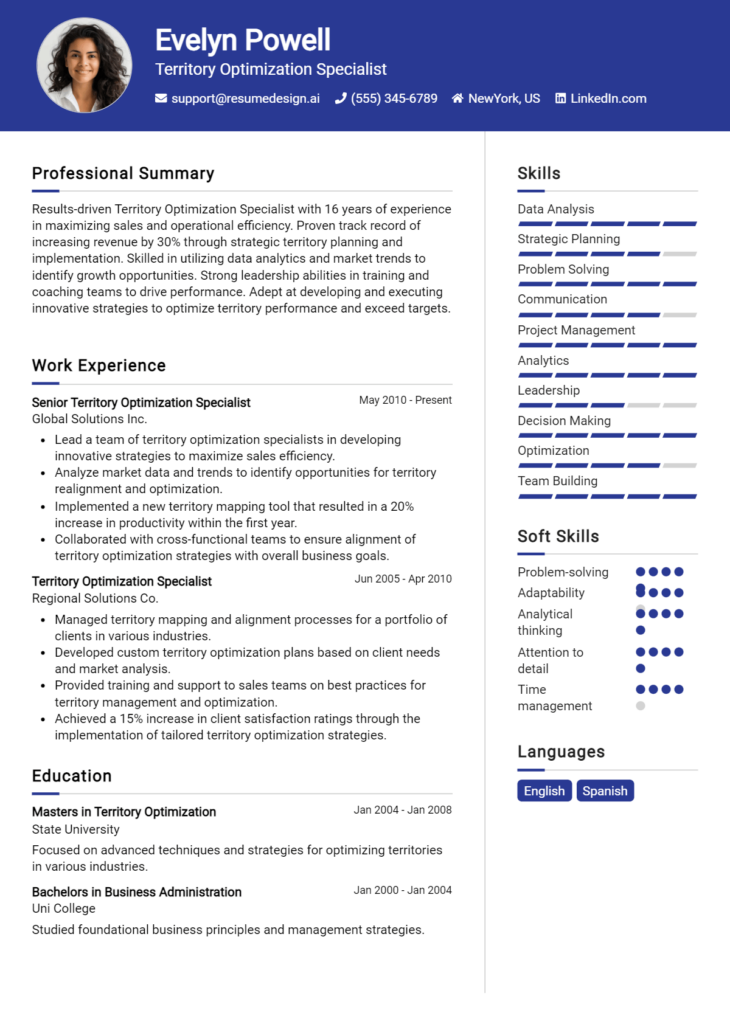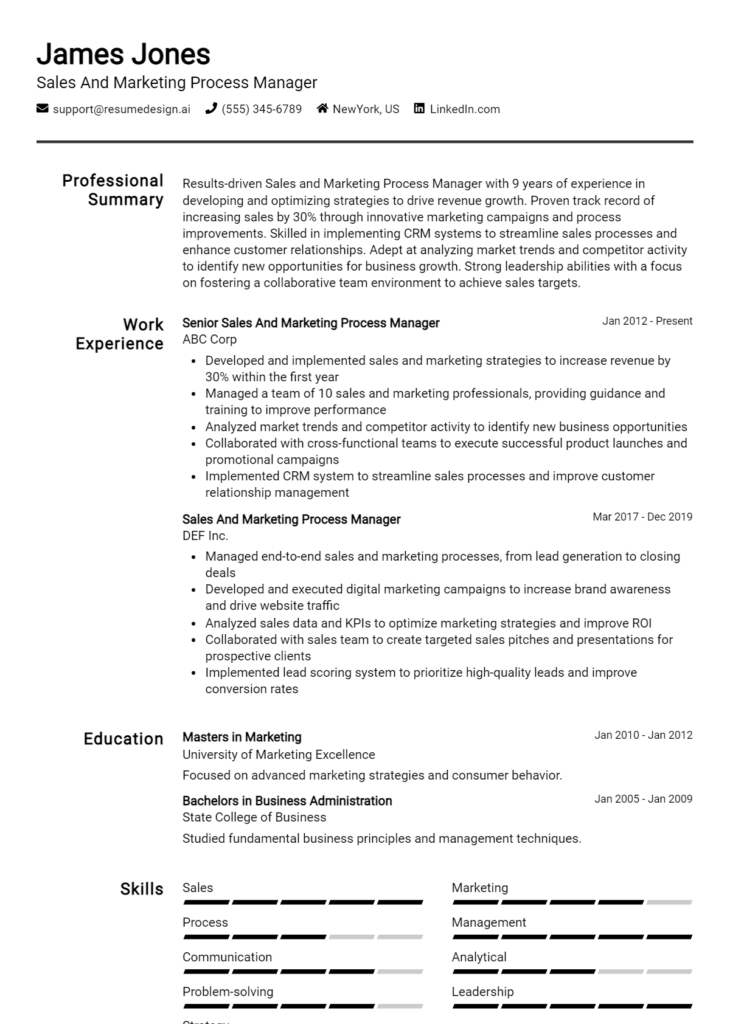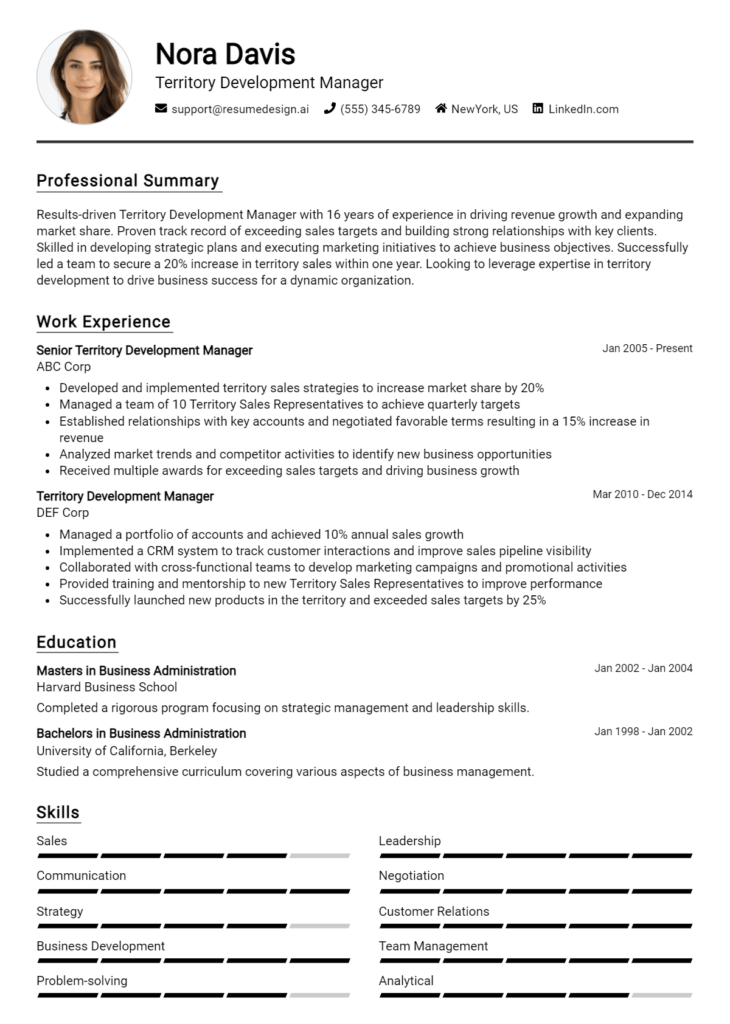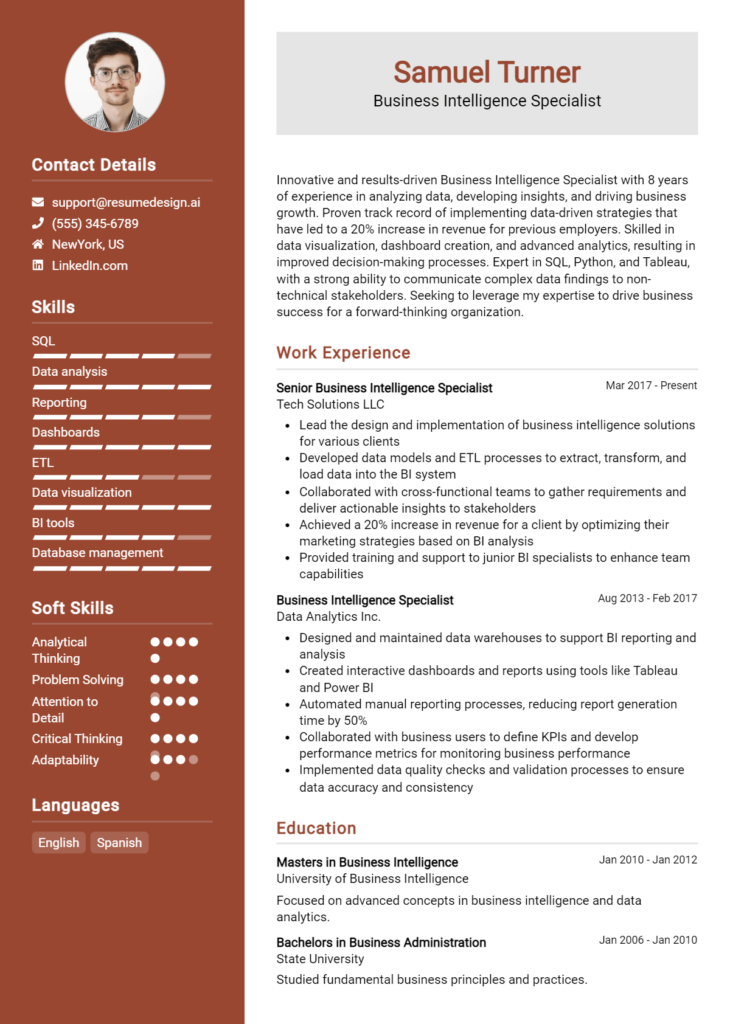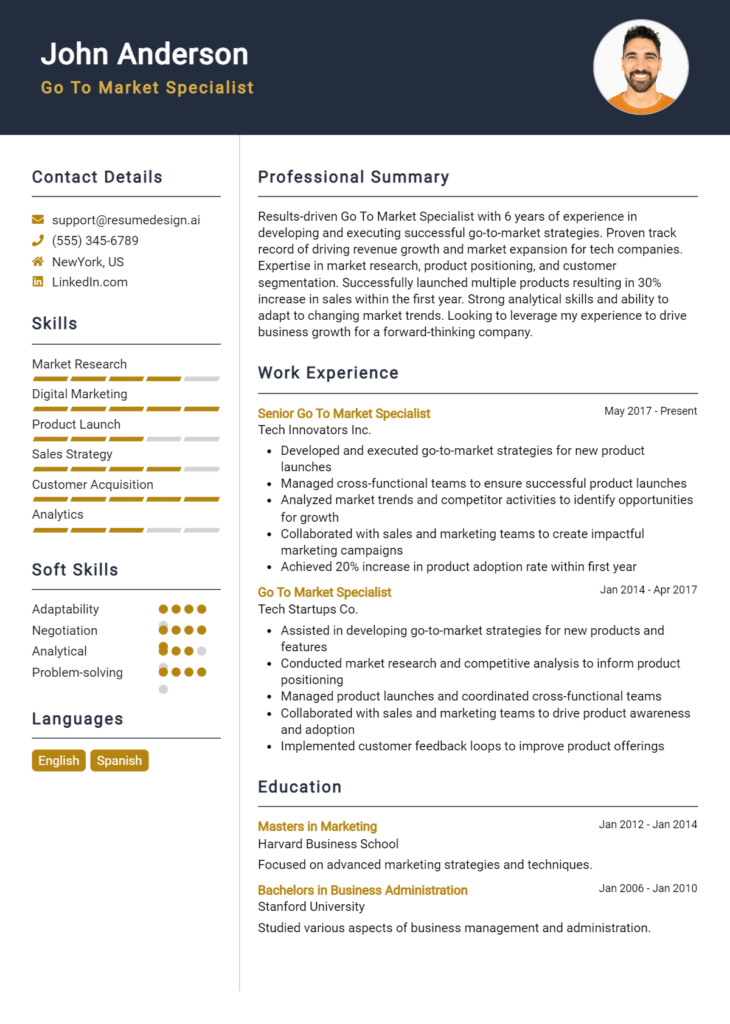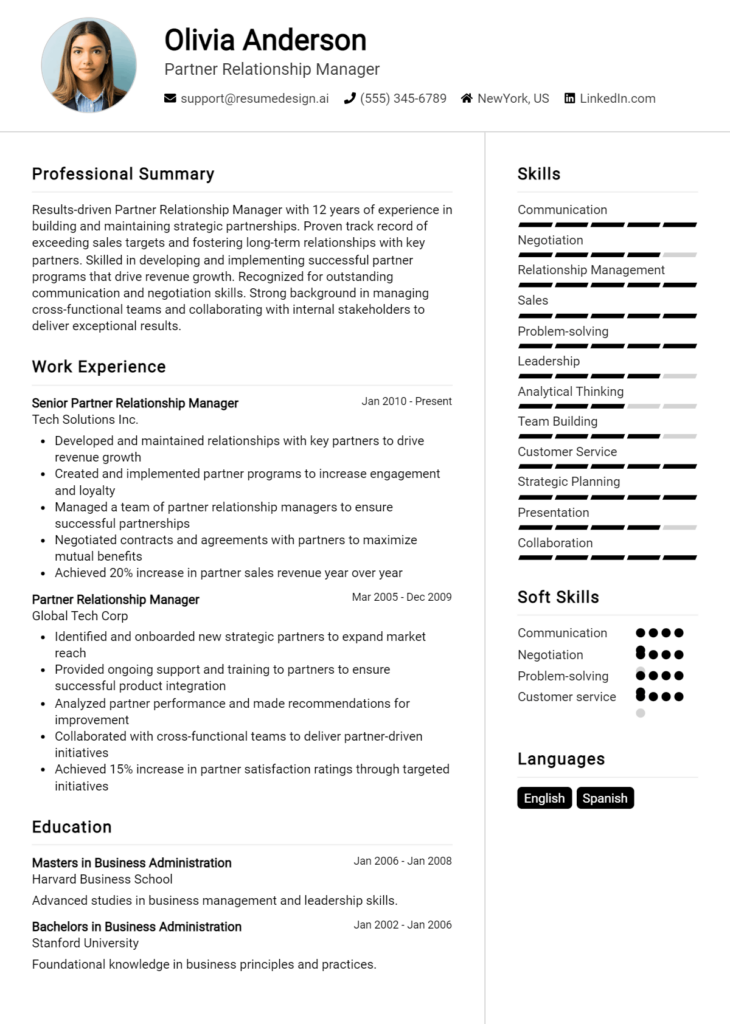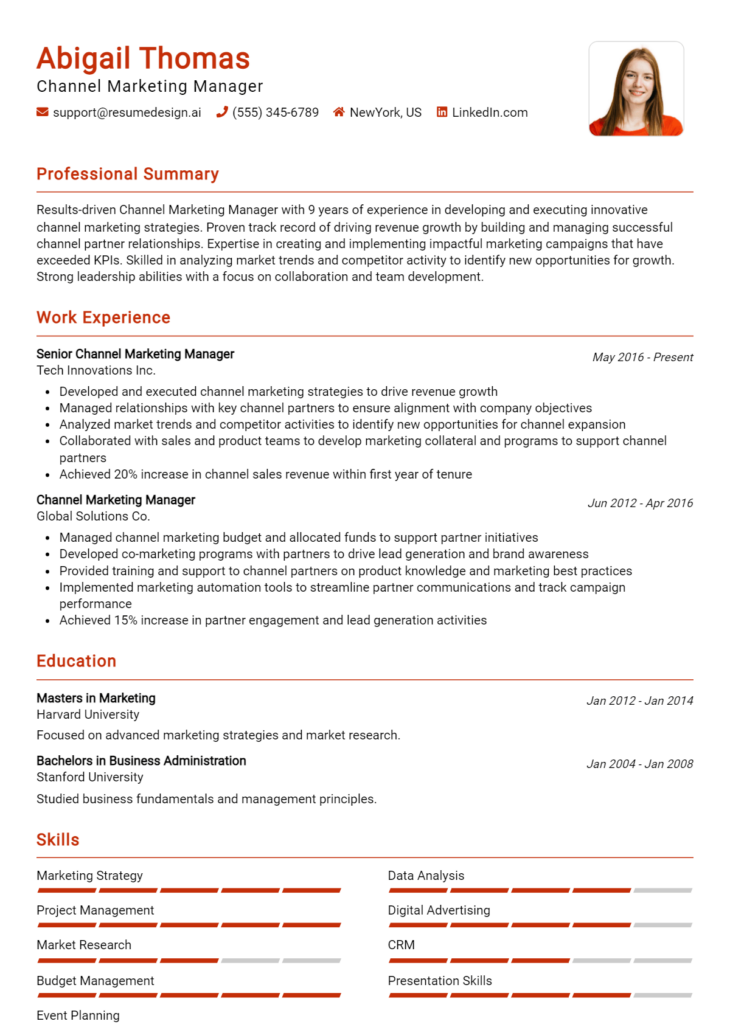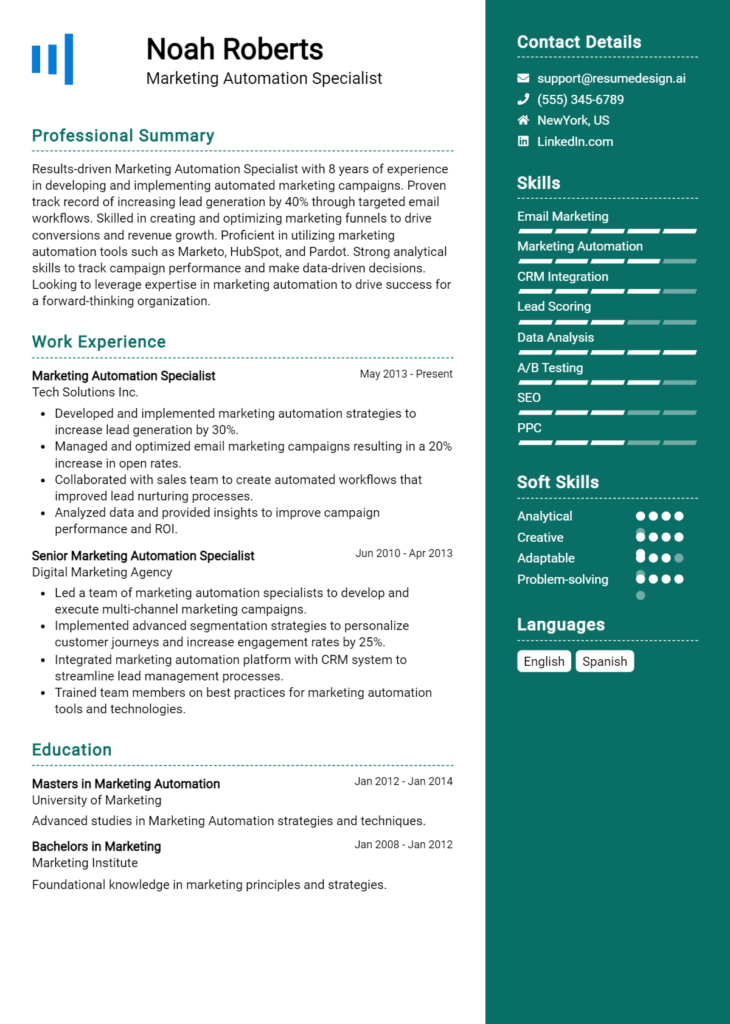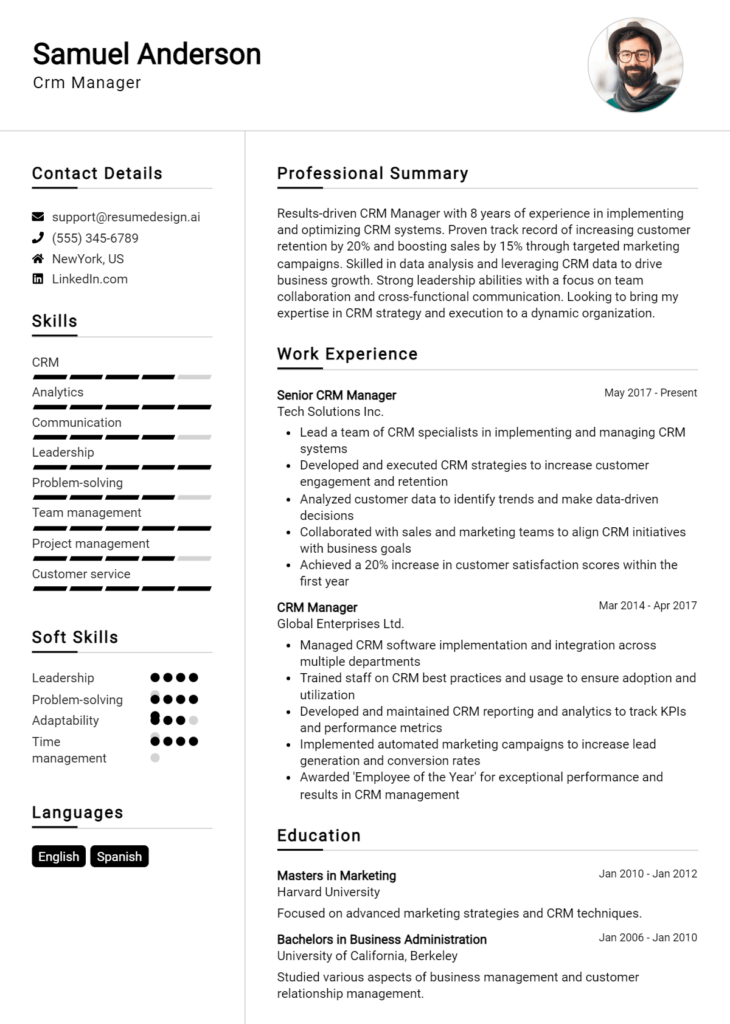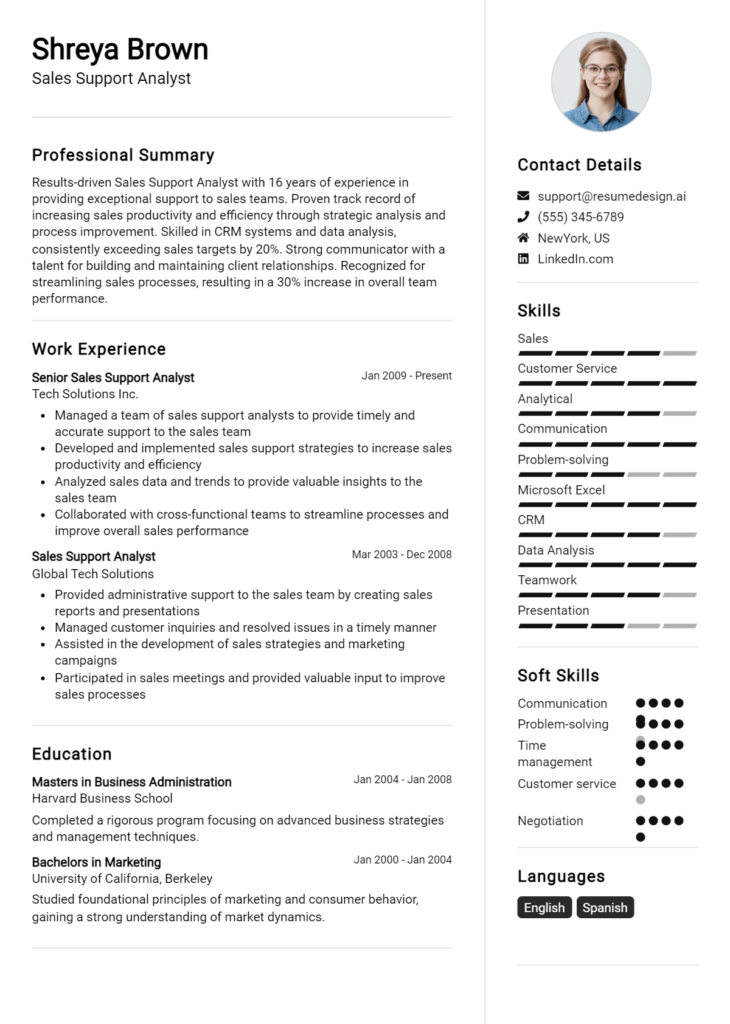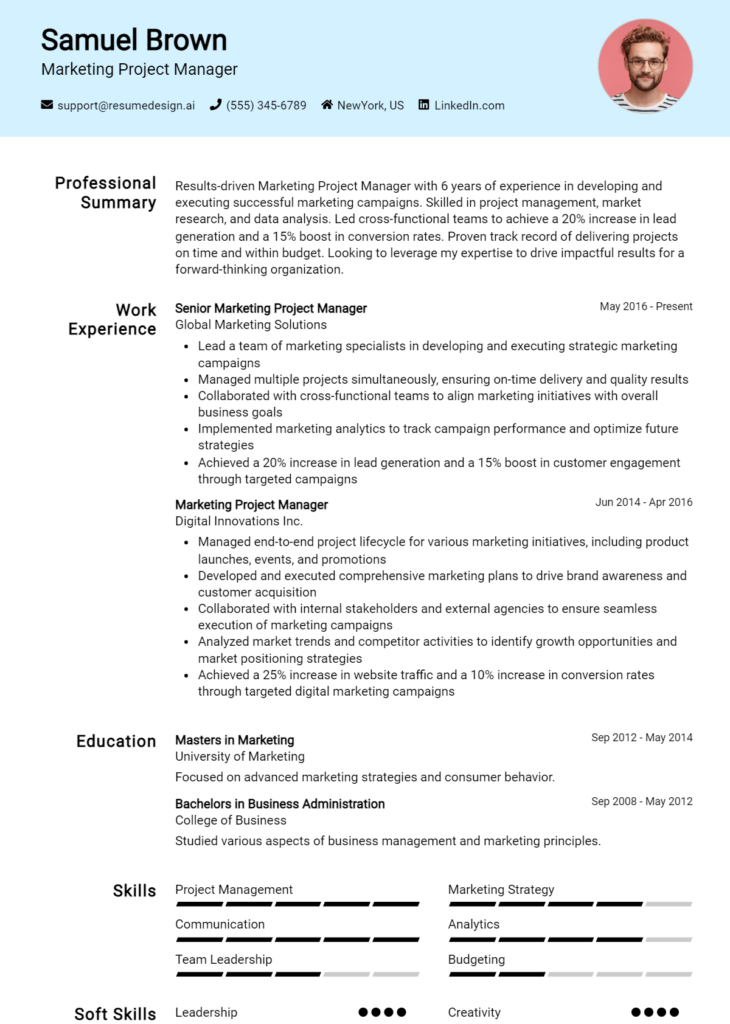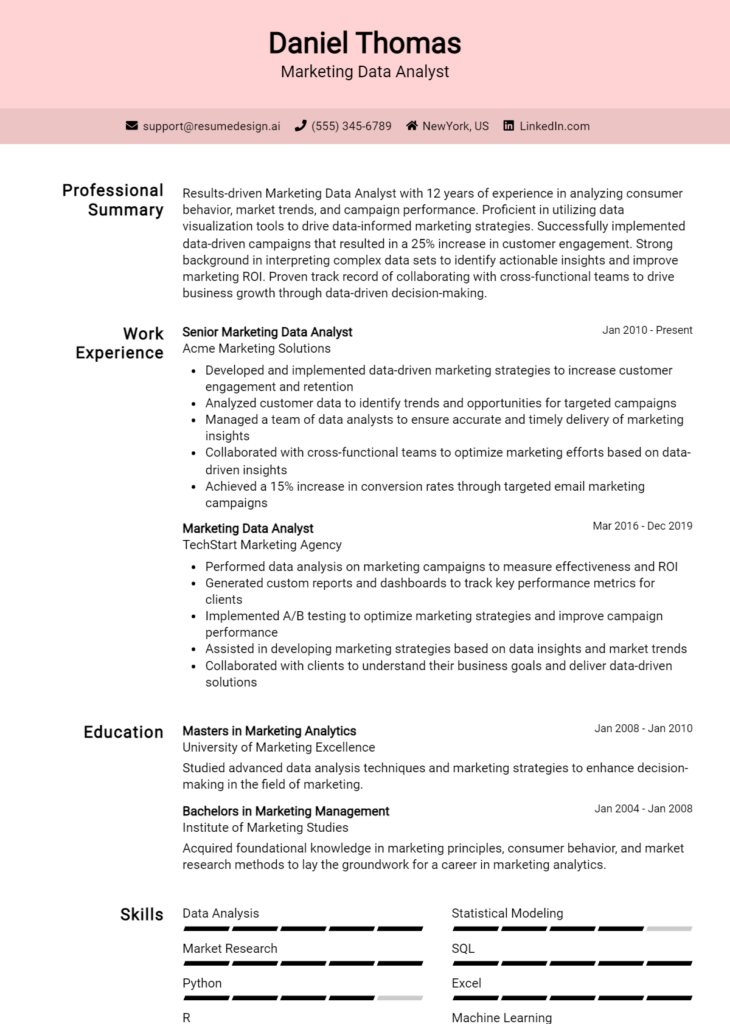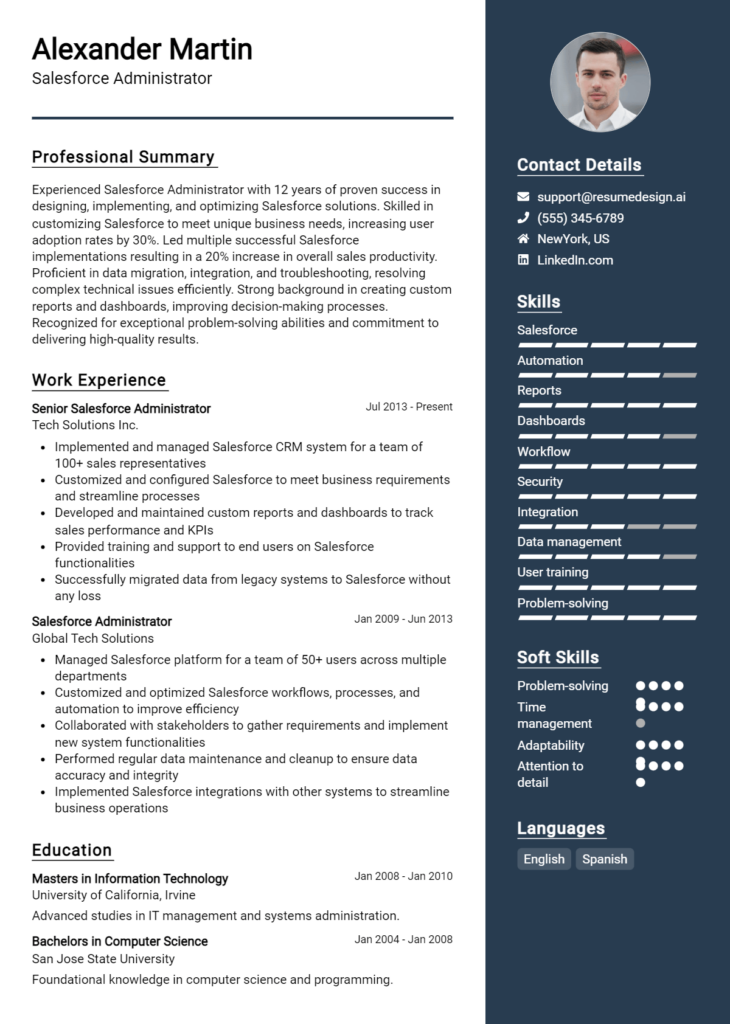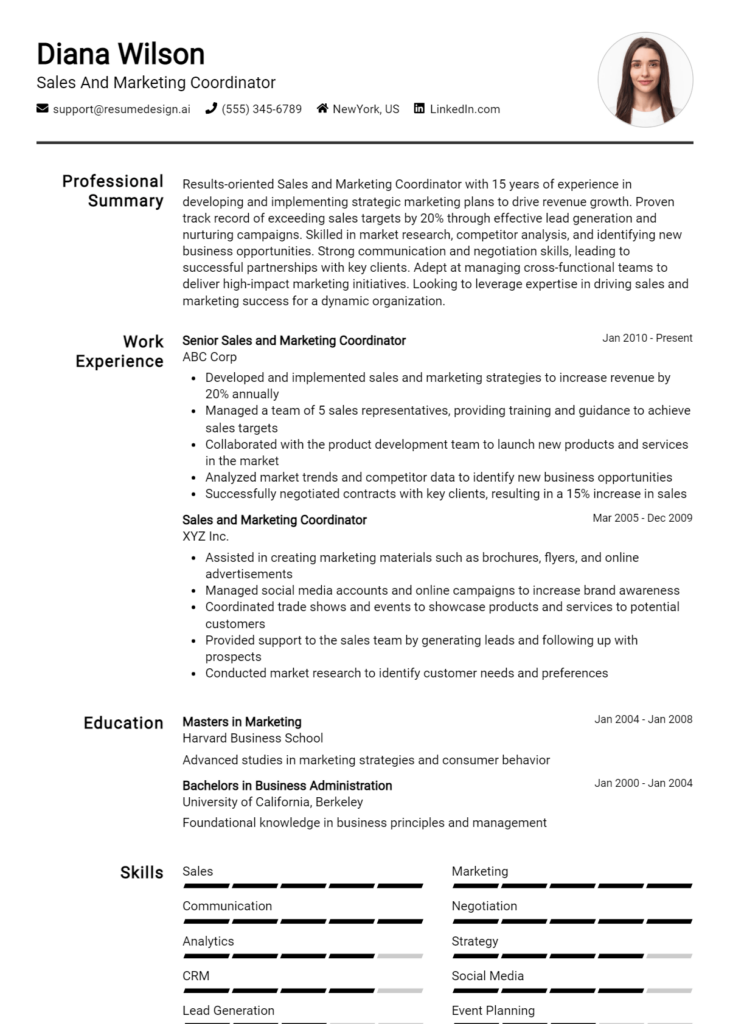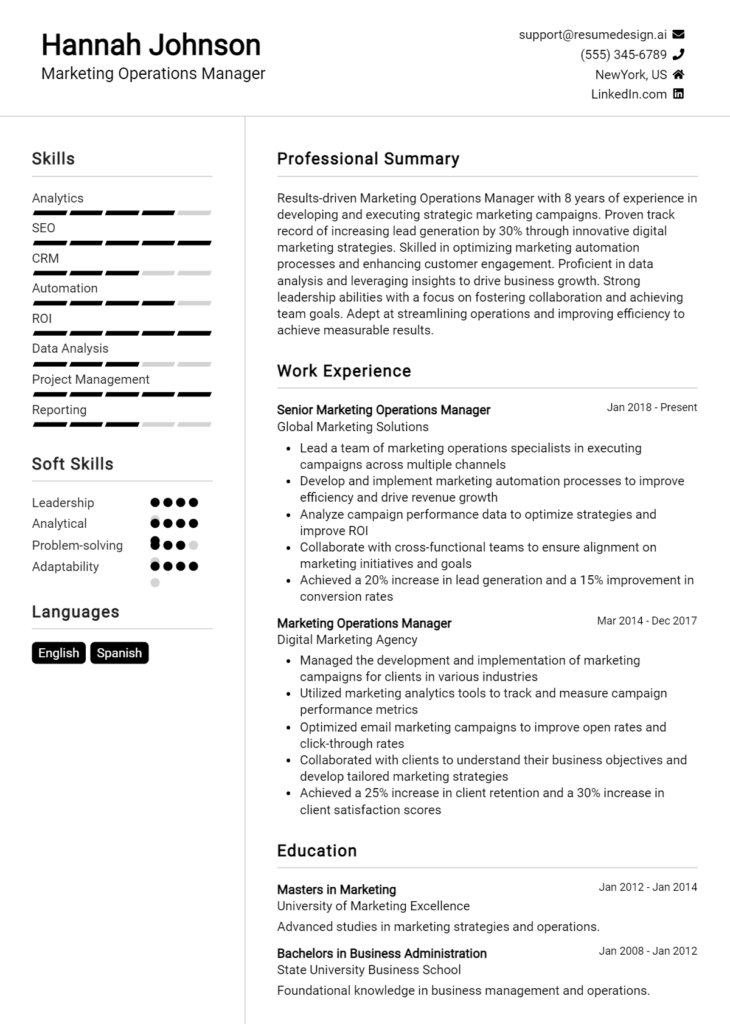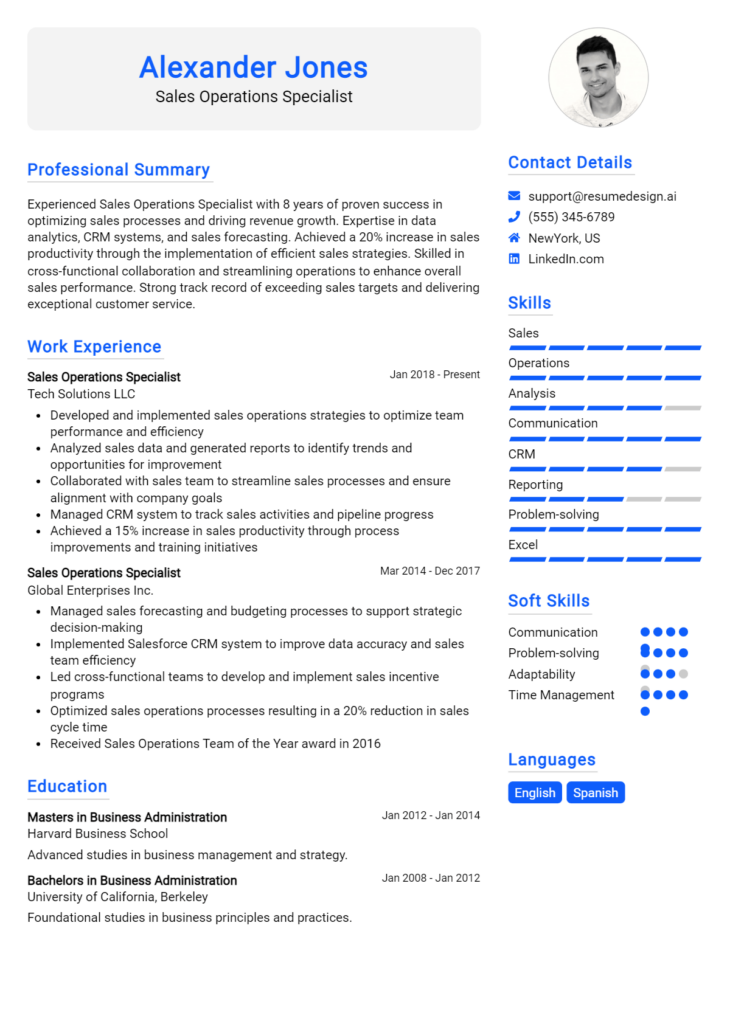Sales Compensation Analyst Core Responsibilities
A Sales Compensation Analyst plays a vital role in aligning sales strategies with organizational goals by analyzing compensation structures and ensuring they motivate performance. This professional collaborates across departments, including HR and finance, to develop and implement compensation plans that drive sales efforts. Key skills include technical proficiency in analytics tools, operational efficiency, and strong problem-solving abilities. Mastery of these skills ensures the organization attracts and retains top talent while achieving revenue targets. A well-structured resume can effectively showcase these qualifications, highlighting the candidate's impact on overall business success.
Common Responsibilities Listed on Sales Compensation Analyst Resume
- Design and analyze sales compensation plans to optimize performance.
- Collaborate with HR and finance teams to ensure alignment of compensation strategies.
- Conduct market research to benchmark compensation against industry standards.
- Prepare detailed reports on sales performance and compensation effectiveness.
- Monitor and evaluate the effectiveness of existing compensation programs.
- Provide analytical support for compensation-related decisions and initiatives.
- Assist in the administration of incentive programs and payouts.
- Conduct training sessions for sales teams on compensation structures.
- Identify trends and recommend adjustments to compensation plans.
- Maintain databases and tools for compensation analysis.
- Support audits and compliance related to compensation practices.
- Communicate compensation plans and changes to relevant stakeholders.
High-Level Resume Tips for Sales Compensation Analyst Professionals
In the competitive landscape of Sales Compensation Analyst roles, a well-crafted resume serves as a vital tool in making a strong first impression on potential employers. It is often the first glimpse hiring managers have into a candidate's professional capabilities and achievements. An effective resume not only highlights relevant skills but also showcases measurable accomplishments that align with the demands of the position. This guide aims to equip Sales Compensation Analyst professionals with practical and actionable resume tips that will enhance their chances of standing out in a crowded job market.
Top Resume Tips for Sales Compensation Analyst Professionals
- Tailor your resume to the specific job description by incorporating keywords and phrases used in the job posting.
- Highlight relevant experience in sales compensation analysis, including any specific tools or software you are proficient in.
- Quantify your achievements wherever possible, using metrics to demonstrate how your work positively impacted sales performance or revenue.
- Showcase your understanding of compensation structures and models, illustrating your ability to design and implement effective compensation plans.
- Include industry-specific skills, such as knowledge of incentive compensation management systems or familiarity with sales performance metrics.
- Utilize a clean and professional format that enhances readability and allows key information to stand out.
- Incorporate a summary statement at the top of your resume that succinctly captures your career goals and relevant expertise.
- List certifications or training related to sales compensation or analytics, as these can set you apart from other candidates.
- Proofread your resume to eliminate any errors, as attention to detail is crucial in the field of analysis.
By implementing these tips, Sales Compensation Analyst professionals can significantly enhance their resumes, thereby increasing their chances of landing a job in this specialized field. A polished and targeted resume not only reflects a candidate's qualifications but also communicates their commitment to the role and the value they can bring to an organization.
Why Resume Headlines & Titles are Important for Sales Compensation Analyst
In the competitive landscape of job applications, the role of a Sales Compensation Analyst requires candidates to present their qualifications succinctly and effectively. Resume headlines and titles are critical components that can make a significant impact on hiring managers. A well-crafted headline serves as a first impression, grabbing attention and summarizing a candidate's key qualifications in a powerful, concise phrase. This is crucial for a Sales Compensation Analyst, where expertise in compensation structures, analytical skills, and industry knowledge are paramount. A strong headline should be concise, relevant, and directly aligned with the job being applied for, ensuring that it resonates with the specific requirements of the position.
Best Practices for Crafting Resume Headlines for Sales Compensation Analyst
- Keep it concise: Aim for one impactful phrase that encapsulates your expertise.
- Be role-specific: Tailor your headline to reflect the Sales Compensation Analyst position.
- Highlight key qualifications: Focus on your most relevant skills and experiences.
- Use action-oriented language: Choose dynamic verbs that convey initiative and impact.
- Incorporate industry keywords: Use terminology that aligns with the sales compensation field.
- Avoid jargon: Ensure your headline is easily understandable and avoids overly technical language.
- Make it unique: Differentiate yourself from other candidates with a distinctive phrase.
- Reflect your career goals: Align your headline with your professional aspirations and the job opportunity.
Example Resume Headlines for Sales Compensation Analyst
Strong Resume Headlines
"Results-Driven Sales Compensation Analyst with 5+ Years of Experience in Designing Incentive Plans"
“Detail-Oriented Analyst Specializing in Sales Compensation Strategy and Data Analytics”
“Innovative Sales Compensation Specialist with a Proven Track Record in Enhancing Revenue Performance”
“Strategic Sales Compensation Analyst Focused on Maximizing Sales Force Effectiveness”
Weak Resume Headlines
“Sales Analyst Seeking Opportunities”
“Experienced Professional Looking for Work”
The strong headlines are effective because they provide a clear, compelling summary of the candidate's strengths and qualifications, making it easy for hiring managers to quickly assess their fit for the Sales Compensation Analyst role. Each strong headline includes specific details about experience, skills, or accomplishments, which demonstrates relevance and expertise. In contrast, the weak headlines fail to impress due to their vagueness and lack of specific information. They do not effectively convey the candidate's qualifications or align with the specific job they are applying for, ultimately missing the opportunity to capture the attention of hiring managers.
Writing an Exceptional Sales Compensation Analyst Resume Summary
A well-crafted resume summary is essential for a Sales Compensation Analyst, as it serves as the first impression a hiring manager will have of a candidate. This brief yet powerful section quickly captures attention by highlighting key skills, relevant experience, and notable accomplishments that align with the job role. A strong summary is concise, impactful, and tailored to the specific position being applied for, providing a snapshot that encourages further reading of the resume.
Best Practices for Writing a Sales Compensation Analyst Resume Summary
- Quantify achievements: Use specific numbers to demonstrate your impact, such as the percentage improvement in compensation plans.
- Focus on skills: Highlight critical skills such as data analysis, financial modeling, and knowledge of compensation structures.
- Tailor the summary: Customize your summary for each job description, aligning your experience with the specific needs of the employer.
- Use action verbs: Start sentences with dynamic verbs to convey confidence and proactivity, such as "developed," "analyzed," or "optimized."
- Showcase relevant experience: Mention previous roles or projects that directly relate to sales compensation analysis.
- Keep it concise: Aim for 3-5 sentences that effectively convey your qualifications without overwhelming the reader.
- Highlight industry knowledge: If applicable, reference your understanding of the industry trends in sales compensation.
- Include certifications: Mention any relevant certifications or professional training that add credibility to your expertise.
Example Sales Compensation Analyst Resume Summaries
Strong Resume Summaries
Results-driven Sales Compensation Analyst with over 5 years of experience optimizing compensation structures, leading to a 20% increase in sales team performance. Proficient in data analysis and financial modeling, with a proven track record in developing incentive plans that align with corporate objectives.
Detail-oriented analyst with a strong background in designing and implementing compensation strategies. Successfully reduced compensation discrepancies by 15% through data-driven evaluations and cross-departmental collaboration, enhancing overall employee satisfaction.
Dynamic Sales Compensation Analyst skilled in leveraging analytics to inform compensation decisions. Increased sales productivity by 30% through the development of a competitive commission structure, resulting in a significant rise in quarterly revenue.
Experienced in sales compensation analysis with a focus on actionable insights and strategic planning. Played a key role in revamping the commission framework, which led to a 25% reduction in turnover among top performers.
Weak Resume Summaries
Sales Compensation Analyst with experience in various areas of compensation. Looking for a new opportunity to apply my skills.
Analyst with knowledge of sales compensation. I have worked in different roles and am eager to help a company improve its processes.
The strong resume summaries effectively showcase specific achievements, skills, and relevance to the Sales Compensation Analyst role, using quantifiable results that demonstrate the candidate's impact. In contrast, the weak summaries lack detail, specificity, and measurable outcomes, making them less compelling and memorable to hiring managers.
Work Experience Section for Sales Compensation Analyst Resume
The work experience section of a Sales Compensation Analyst resume is crucial as it serves as a platform for candidates to demonstrate their technical skills, their ability to manage teams, and their success in delivering high-quality compensation solutions. This section allows potential employers to gauge the candidate's expertise in analyzing sales data, creating compensation plans, and collaborating with various stakeholders. By quantifying achievements and aligning their experience with industry standards, candidates can effectively showcase their value and suitability for the role.
Best Practices for Sales Compensation Analyst Work Experience
- Highlight specific technical skills, such as proficiency in compensation software and data analysis tools.
- Use quantifiable results to demonstrate the impact of your work, such as increased sales performance or improved compensation accuracy.
- Emphasize collaboration by detailing your experience working with sales teams, HR, and finance departments.
- Incorporate industry-specific terminology to align your experience with current trends and standards.
- Focus on your role in project leadership, including any initiatives you spearheaded or contributed to significantly.
- Detail your experience in developing and implementing compensation programs that support business objectives.
- Tailor your work experience to match the job description, ensuring relevance to the position you are applying for.
- Maintain clarity and conciseness; avoid jargon that may confuse the reader.
Example Work Experiences for Sales Compensation Analyst
Strong Experiences
- Developed a new sales compensation model that resulted in a 15% increase in sales productivity within six months.
- Led a cross-functional team to streamline compensation processes, reducing errors by 25% and improving the overall efficiency of the compensation cycle.
- Implemented a data analytics tool that enhanced the accuracy of commission forecasting, leading to a 20% improvement in budget adherence.
- Collaborated with HR and finance teams to design a compensation strategy aligned with business goals, contributing to a 10% decrease in turnover rates among top performers.
Weak Experiences
- Worked on some compensation projects and helped with analysis.
- Participated in meetings regarding sales compensation strategies.
- Assisted with compensation reports and made minor adjustments.
- Involved in discussions about commission structures without any specific outcomes mentioned.
The strong experiences listed above are considered effective because they provide clear, quantifiable outcomes and demonstrate the candidate's technical leadership and collaboration skills. Each bullet point highlights specific achievements and the impact of those efforts, making it easy for potential employers to recognize the candidate's value. In contrast, the weak experiences lack detail and measurable results, making them less impressive and failing to convey the candidate's contributions or expertise in the field.
Education and Certifications Section for Sales Compensation Analyst Resume
The education and certifications section of a Sales Compensation Analyst resume is crucial as it showcases the candidate's academic background and relevant qualifications, directly influencing their credibility and perceived expertise in the field. This section not only reflects the foundational knowledge acquired through formal education but also highlights industry-recognized certifications and continuous learning efforts that align with the evolving demands of the sales compensation landscape. By providing details on relevant coursework, specialized training, and certifications, candidates can significantly enhance their alignment with the job role and demonstrate their commitment to professional growth in this specialized area.
Best Practices for Sales Compensation Analyst Education and Certifications
- Include only relevant degrees and certifications that relate to sales compensation or financial analysis.
- List your most recent education first, along with the institution's name and graduation date.
- Highlight advanced degrees (such as a Master's) or specialized certifications (like Certified Compensation Professional) that are recognized in the industry.
- Provide details on relevant coursework that directly pertains to sales compensation, analytics, or finance.
- Include any ongoing professional development courses or workshops that reflect your commitment to staying current in the field.
- Use clear and concise language to describe your educational qualifications and certifications, avoiding unnecessary jargon.
- Consider including GPA or honors if they are particularly impressive and relevant to the role.
- Tailor this section to match the specific requirements of the job description when applying for positions.
Example Education and Certifications for Sales Compensation Analyst
Strong Examples
- M.B.A. in Finance, University of XYZ, Graduated May 2021
- Certified Compensation Professional (CCP), WorldatWork, Obtained 2022
- Bachelor of Science in Business Administration, Major in Human Resources, University of ABC, Graduated May 2019
- Relevant Coursework: Advanced Compensation Strategies, Data Analytics for HR, Financial Modeling
Weak Examples
- High School Diploma, Local High School, Graduated 2015
- Certification in Basic Microsoft Office, Completed 2020
- Associates Degree in Liberal Arts, Community College, Graduated 2018
- Online Course: Introduction to Sales, Completed 2019
The strong examples listed demonstrate a clear alignment with the Sales Compensation Analyst role, showcasing advanced degrees and specialized certifications that are highly regarded in the industry. They reflect a commitment to relevant education and continuous professional development. In contrast, the weak examples illustrate qualifications that lack relevance to the position, such as a high school diploma or unrelated certifications, which do not enhance the candidate's profile and may detract from their overall suitability for the role.
Top Skills & Keywords for Sales Compensation Analyst Resume
In the competitive landscape of sales compensation analysis, possessing the right skills is crucial for crafting a standout resume. A Sales Compensation Analyst plays a vital role in developing and managing incentive plans that drive sales performance and align with organizational goals. Highlighting both hard and soft skills in your resume not only showcases your technical abilities but also reflects your capacity to collaborate effectively within teams and adapt to changing business environments. By focusing on these skills, you can demonstrate your value to potential employers and enhance your prospects in this dynamic field.
Top Hard & Soft Skills for Sales Compensation Analyst
Hard Skills
- Proficiency in Excel and advanced spreadsheet functions
- Knowledge of compensation design and administration
- Familiarity with sales performance management tools
- Experience with data analysis and statistical modeling
- Understanding of financial metrics and KPIs
- Expertise in compensation software (e.g., Xactly, Varicent)
- Ability to create and interpret compensation reports
- Knowledge of legal and regulatory compliance in compensation
- Proficient in SQL or other database management languages
- Familiarity with Human Resources Information Systems (HRIS)
- Understanding of market research and benchmarking
- Skills in developing compensation policies and guidelines
- Experience in budget forecasting and financial analysis
- Ability to conduct job evaluations and market pricing
Soft Skills
- Strong analytical and problem-solving abilities
- Excellent communication and presentation skills
- Team collaboration and interpersonal skills
- Attention to detail and accuracy
- Adaptability and flexibility in a fast-paced environment
- Critical thinking and decision-making skills
- Project management capabilities
- Strong organizational skills
- Ability to manage multiple priorities and deadlines
- Customer service orientation
- Initiative and self-motivation
- Conflict resolution and negotiation skills
- Empathy and emotional intelligence
- Ability to influence and persuade stakeholders
By incorporating these skills into your resume, along with a strong work experience section, you can create a compelling narrative that positions you as a qualified candidate for a Sales Compensation Analyst role.
Stand Out with a Winning Sales Compensation Analyst Cover Letter
I am excited to apply for the Sales Compensation Analyst position at [Company Name], as advertised. With a robust background in data analysis and a keen understanding of sales strategies, I am well-prepared to contribute to your team by optimizing compensation plans that drive performance and align with business objectives. My experience in designing and implementing effective compensation structures has equipped me with the skills necessary to analyze complex data sets and provide actionable insights.
In my previous role at [Previous Company Name], I successfully led a project that revamped the sales compensation framework, resulting in a 20% increase in sales productivity within the first quarter of implementation. By collaborating closely with sales leadership and HR, I was able to identify key performance indicators that motivated the sales team. My proficiency in Excel, SQL, and compensation management software enabled me to create detailed reports and dashboards, allowing stakeholders to make informed decisions based on real-time data.
I am particularly drawn to the opportunity at [Company Name] because of your commitment to fostering a performance-driven culture. I believe that a well-structured compensation plan can significantly enhance employee motivation and retention. I am eager to bring my analytical skills and strategic thinking to your organization, ensuring that your sales team is not only motivated but also fairly rewarded for their contributions.
Thank you for considering my application. I look forward to the possibility of discussing how my experience and passion for sales compensation can help [Company Name] achieve its goals. Please feel free to contact me at your earliest convenience to schedule a conversation.
Common Mistakes to Avoid in a Sales Compensation Analyst Resume
When crafting a resume for a Sales Compensation Analyst position, candidates often overlook critical elements that can significantly impact their chances of landing an interview. A well-structured and tailored resume is essential, as it showcases not only your qualifications but also your understanding of the role's specifics. Here are some common mistakes to avoid that can detract from your resume's effectiveness:
Generic Objective Statements: Using a one-size-fits-all objective statement can make your resume appear unfocused. Tailor it to align with the specific job and company you're applying to, highlighting your relevant skills and aspirations.
Overloading with Jargon: While industry-specific terminology is important, overusing jargon can alienate recruiters. Aim for a balance by clearly explaining your expertise without overwhelming the reader.
Lack of Quantifiable Achievements: Failing to include measurable accomplishments can weaken your resume. Use numbers, percentages, and specific examples to demonstrate your impact in previous roles, such as reduced costs or improved sales performance.
Ignoring Keywords: Many companies use Applicant Tracking Systems (ATS) to filter resumes. Not incorporating relevant keywords from the job description can result in your resume being overlooked. Carefully analyze the job listing and include pertinent terms throughout your resume.
Poor Formatting: A cluttered or unprofessional format can make your resume difficult to read. Stick to a clean layout with consistent fonts, bullet points, and adequate spacing to enhance readability.
Including Irrelevant Experience: Adding unrelated work experience can dilute the focus of your resume. Prioritize positions and projects that directly relate to sales compensation analysis to strengthen your candidacy.
Neglecting Soft Skills: While technical skills are crucial, overlooking soft skills can be a mistake. Highlight abilities such as analytical thinking, problem-solving, and communication, which are essential for collaboration and influencing stakeholders in sales compensation.
Failure to Update: Submitting an outdated resume can lead to missed opportunities. Regularly revise your resume to reflect your most recent experiences, skills, and accomplishments, ensuring it remains relevant to your career goals.
Conclusion
As a Sales Compensation Analyst, you play a crucial role in shaping your organization's sales strategies through effective compensation plans. In this article, we explored the essential skills and qualifications needed for this role, including analytical abilities, proficiency in data analysis tools, and a solid understanding of sales processes. We also discussed the importance of collaboration with sales teams and management to ensure that compensation structures are aligned with business objectives and motivate performance.
In conclusion, if you're looking to advance your career as a Sales Compensation Analyst, it's vital to have a well-crafted resume that highlights your skills and experience. Take the time to review your resume to ensure it effectively showcases your qualifications. To assist you in this process, consider utilizing available resources such as resume templates, a resume builder, resume examples, and cover letter templates. These tools can help you create a standout application that captures the attention of hiring managers. Don’t wait—start refining your resume today!

